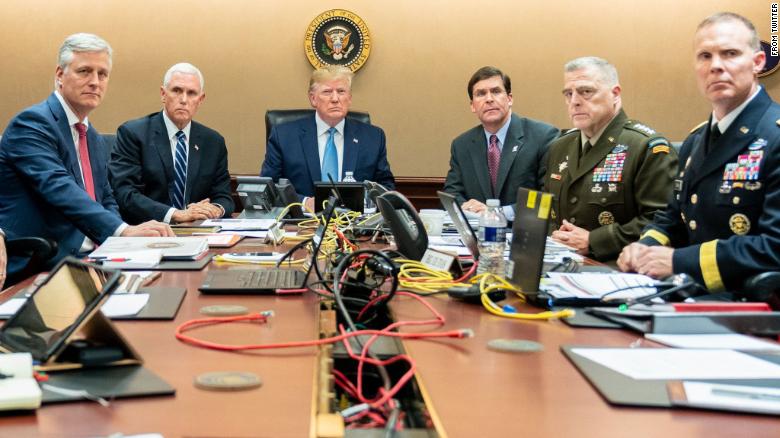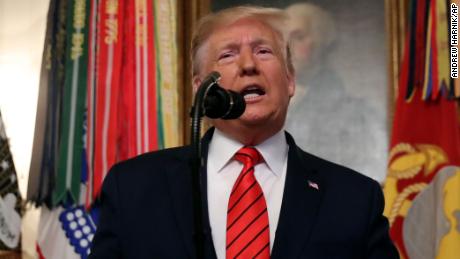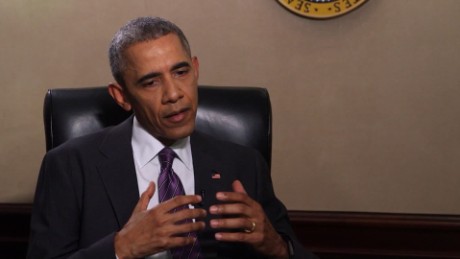Photos highlight stark differences in Trump and Obama approaches

The execution and aftermath of the raids that took down Osama bin Laden and Abu Bakr al-Baghdadi were as different as the presidents overseeing them. But in one area they converged: Barack Obama and Donald Trump both wanted to watch.
How each leader handled the defining moment says as much about their mindset as it does their foreign policy. Before, during and after the raids that took down two highly sought terrorists, Obama and Trump adopted divergent approaches and were met with different reactions from the American public.
Both recognized, however, the weight the moments carried for their legacy. And both wanted to see it happen.
"As though you were watching a movie," Trump recalled Sunday after announcing the death of the ISIS leader in graphically detailed terms.
"We were essentially watching what was happening in real time," Obama recounted to CNN in 2016, five years after Navy SEALs took out the 9/11 mastermind.
It's easy to understand the impulse. Coming in the third year of their presidencies, the raids carried the possibility of vindication and the risk of devastating failure. Looming was the legacy of Jimmy Carter, whose mishandling of a high-stakes foreign policy matter -- the Iran hostage crisis -- may have cost him a second term.
Obama exercised caution afterward and avoided disclosing details of the raid; Trump was eager to tease the news and laid out much of its particulars himself. And while Obama and his aides were careful to avoid inflaming bin Laden's followers, Trump made a point of coloring Baghdadi's last moments with an emasculating description of "whimpering and crying and screaming all the way."
The photos
Photographs of the two moments capture leaders on edge. Trump, stone-faced and formal in a suit and necktie, sits at the head of a long Situation Room table surrounded by similarly grave advisers, some in military uniform, as the raid played out on large screens. The literal and symbolic central figure, Trump projects the sense of authority he has often craved as commander-in-chief.
The rigid posture and imposing presidential seal stand in contrast to the photo of Obama, in a polo shirt and windbreaker, leaning forward as his team huddled around laptops as word came from Abbottabad that "Geronimo" -- the code name given bin Laden -- had been killed. Obama, slightly off-center with his chair pushed into a corner, is not the eye's natural point of focus.
The photos are from different rooms: Trump's was taken in the John F. Kennedy Conference Room, the iconic command post famously reproduced in movies and on television shows where presidents are briefed on highly classified missions.
Obama was briefed in the lead-up to the bin Laden raid from the same head-of-table position where Trump is shown watching the Baghdadi mission. He sat there as Admiral William McRaven, the Joint Special Operations commander, narrated the mission from an outpost in Afghanistan.
But later, as word came there was a better view to be had down the hallway, he and his team decamped to the smaller conference room where a video feed was playing on the general's laptop. It is there the tableau -- crowded with others, including a hand-to-mouth Hillary Clinton -- was snapped.
If both presidents wanted to view the operations they personally ordered that took down their era's most wanted terrorists, there was little else in common in how they handled the high-wire decision and subsequent exaltation of the missions' successes.
When he took office, Obama made clear to his first CIA Director Leon Panetta that finding bin Laden was a priority. Nine months before the raid, Obama was first briefed on the possibility the US had located the terrorist at a compound in Pakistan. But without certainty, Obama was left with a choice.
"I had been inclined to take the shot fairly early on in the discussions. But you hold back the decision until you have to make it. And in the end, what I very much appreciated, was the degree to which we had an honest debate," Obama told CNN in 2016. "It was, in that way, emblematic of presidential decision-making, you're always working with probabilities."
Obama spent at least some of the lead-up to the bin Laden mission fine-tuning jokes for that year's White House Correspondent's Dinner -- including jabs directed at Trump, whose relentless and racist pursuit of Obama's birth certificate had that week pushed Obama to release the document. He authorized the mission the same week.
As a tuxedoed Obama was ribbing an unenthused Trump for his reality-show decision-making -- "You fired Gary Busey!" -- his team was making final preparations for the raid that would launch in a matter of hours.
Trump, meanwhile, began discussions about possible operations to take out Baghdadi over the past several weeks as surveillance showed the ISIS leader on a compound near Idlib, Syria. He was presented options for a raid on the compound last week, and made the decision to go forward.
On the day of the raid, he woke up at Camp David after hosting an anniversary party for his daughter and son-in-law, played golf at his course in Virginia with Sen. Lindsey Graham and the commissioner of Major League Baseball, and returned to the White House around 4:30 p.m. ET. The group assembled in the Situation Room 30 minutes later.
Unlike Obama -- who returned to the White House residence to play cards as the Navy SEAL team flew from Afghanistan to Pakistan, only returning when they were on the ground -- Trump remained in the Situation Room for the duration of the mission.
Asked Sunday to describe the difficult decisions he had to make along the way, Trump said: "Well, just death."
"I'm sending a large number of brilliant fighters -- these are the greatest fighters in the world," he said.
Breaking the news
On Saturday evening -- once the US commandos had safely returned from the mission to an as-yet-unidentified base -- Trump offered a cryptic tweet that "Something very big has just happened!" Shortly afterward, the White House said he'd have a "major announcement" the next morning.
"That was to notify you guys that you have something big this morning, so you wouldn't be out playing golf or tennis or otherwise being indisposed," Trump said later.
Among his national security advisers, there was a debate over whether it was too soon to claim victory given a lack of ironclad evidence that it was Baghdadi who'd died in the mission. Trump, however, was itching to announce the news. And media reports soon emerged on the mission in Syria and its target.
Ultimately, Trump was convinced by advisers that announcing Baghdadi's death at 9 a.m. on Sunday -- at the top of the weekly political broadcasts -- would generate more attention. It also gave US officials more time to verify the target.
Obama's aides also debated whether to announce the bin Laden raid the evening it occurred or the next morning. Almost all advocated for waiting -- including Obama, who wanted additional verification it was bin Laden who'd been killed.
After after McRaven told him one of the SEALs on the mission, who was the same size as bin Laden, lay next to the body to confirm its height, Obama wanted more proof: he told him to get a tape measure.
Ultimately, news reports began emerging of a US helicopter crash in Pakistan, whose government urged the White House to announce the news. With a few hours notice, Obama delivered a nine-minute speech announcing the "targeted operation" in Pakistan but offering few details.
"Today's achievement is a testament to the greatness of our country and the determination of the American people," he said from the White House Cross Hall, with the long red carpet stretching behind him. Outside the White House, cheering crowds had gathered.
Trump's prepared remarks were of a similar length but wildly divergent in tone. Describing Baghdadi as a "sick and depraved man" who died "running and crying," Trump ended his prepared section bluntly.
"He died like a dog. He died like a coward. The world is now a much safer place. God bless America. Thank you," he said before taking questions for more than 40 minutes in the White House Diplomatic Reception Room. There were no cheering crowds outside the White House; when Trump attended Game 5 of the World Series that evening, he was booed.
Among the phone calls Obama placed following the successful bin Laden raid was to his own predecessor, George W. Bush, who was eating soufflés with his wife in Dallas when word came that Obama was trying to reach him.
"Good call," Bush told his successor after hearing details of the mission that took out the terrorist he'd spend the majority of his presidency chasing.
Trump, according to aides, hasn't made a similar call. Hogan Gidley, a White House spokesman, said he "wasn't aware" of any communication about the Baghdadi mission between Trump and Obama. A spokesperson for Obama did not comment.
Trump offered little conciliation during remarks in Obama's hometown on Monday.
"He should have been killed years ago," he said of Baghdadi during a speech to police chiefs in Chicago. "Another president should have gotten him."







.jpeg)
Comments
Post a Comment